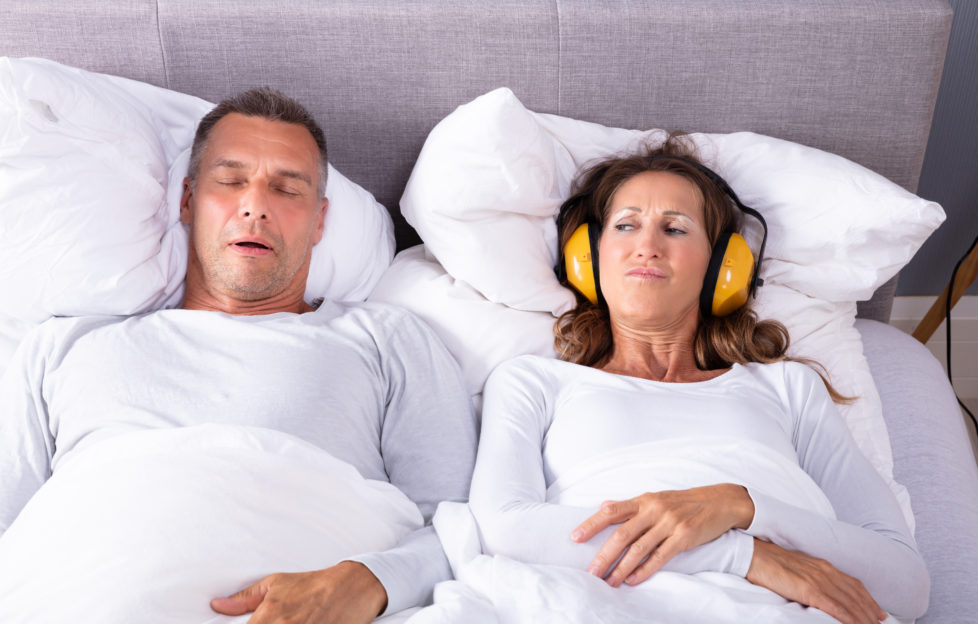Is Snoring Keeping You Awake At Night?

An estimated 41% of the UK population snores – around 15 million of us – meaning the majority of Brits likely know, or are themselves, a snorer.
TEMPUR® sleep expert and chartered psychologist, Suzy Reading, is here to share her guide on snoring do’s and don’ts to help everyone enjoy a more restorative night’s sleep.
Suzy says, “Snoring can be caused by a number of factors and cause your tongue, mouth, throat, or the airways in your nose to vibrate as you breathe. When these parts of your body relax and narrow whilst asleep – snoring occurs.
“For anyone who sleeps with a snorer, the noise can be frustrating to say the least, causing regular sleep disturbances leading to tiredness, irritability and low mood come morning. Hardly the right way to start the day!
“There are, however, a number of everyday lifestyle factors that can impact a person’s likelihood to snore, and there are straightforward ways to minimise – or in some cases – completely eradicate, snoring.”
If you’re a snorer – take a look at your current lifestyle
Being overweight, smoking, dehydration, and drinking alcohol can all increase the tendency to snore. Integrating healthy movement habits, hydration and nutrition will reduce the likelihood of snoring whilst increasing overall quality of sleep and wellbeing.
Keep exercise goals simple – nothing too strenuous is required; a simple walk can suffice. If it is a new habit, start small by taking a daily walk around the block, build it up over time to 30 mins daily, or if you’re really inspired, 20 mins twice daily for maximal effect. This will not only help shed weight, but will lift your mood and energy levels, increase your absorption of Vitamin D – the sunshine vitamin important for building healthy bones – as well as boost your circadian rhythm, which will help you sleep better come night time.
If you have a tendency to wind down with a glass of wine or spirits, identify some healthier swaps or rituals. Herbal tea, a non-alcoholic beverage, a guided meditation, or simply relaxing with a good book.
Your sleep environment can make a difference too
It’s not widely known that the cleanliness of your home can impact snoring. Dust and pollen can both increase the likelihood of snoring, especially if you suffer from allergies. So, make sure to wash your bedding and vacuum regularly, as well as shower and change into clean bedclothes before going to sleep.
If your home has a particular propensity to dust build up, it’s worth considering alternatives to soft furnishings that are easier to keep clean, such as hard floors rather than carpet, and blinds rather than curtains.
Did you know that sleeping on your side reduces snoring?
Sleeping on your side reduces compression of your airways meaning you’re less likely to snore than when sleeping on your back. Firstly, make sure your pillow is the right height to keep your head in neutral alignment with your spine to ensure your airways are clear. Take care when choosing a pillow – the wrong type could cause discomfort whilst sleeping or even neck pain come morning. Try a pillow that is created specifically with side sleepers in mind, like the ergonomically designed Tempur Original Pillow, which provides pressure relieving neck and head support. Wedging additional pillows behind you can keep you from rolling on your back if this is your preferred sleeping position.
If this doesn’t work for you, try a positional trainer – a device that detects when you are sleeping on your back and gives a small vibration alerting you that it is time to turn over.
And if you sleep with a snorer…
Think about what lies within your control and what your partner can control to dial down stress and irritation. Snoring can be maddening to deal with, but it’s important to remember that your partner is not snoring intentionally. If it’s proving difficult to address the snoring, all you can do is try to manage your response to it.
If you’ve tried and failed with earplugs or white noise, try sleeping in separate rooms. If your sleep is suffering, it’s fine to move to a separate bedroom for a couple of nights if it means you’ll be feeling more rested, more positive, and more able to tackle the day.
If after moving to another room you can still hear your partner’s snores, re-focus your attention on something calming – try a coherent breathing exercise consisting of a 5 second inhalation followed by a 5 second exhalation. Coherent breathing exercises are extremely soothing for the nervous system and keeping count can be a useful distraction from your partner’s snoring.
Above all, give yourself permission to find it challenging – it is challenging! Remember that whilst your partner can’t control it, they can make healthy lifestyle choices that reduce the chances of snoring; lifestyle choices that you can support by joining in.
It’s important not to blame and shame, but to keep an open and compassionate dialogue about how it impacts you and what they can do to contribute to a healthier dynamic, which effectively will benefit them too.
What if nothing is working?
Jaw release, mouth, tongue and throat exercises recommended by the Sleep Foundation can be effective tools to lessen the likelihood of snoring. Alternatively, there are a number of anti-snoring devices such as Somnowell which can help keep airways open and reduce snoring.
If snoring has become a real issue for you or your partner, it’s best to speak to your doctor who will be able to check for any underlying health conditions and work with you to find a solution.
For more information on Tempur . . .








